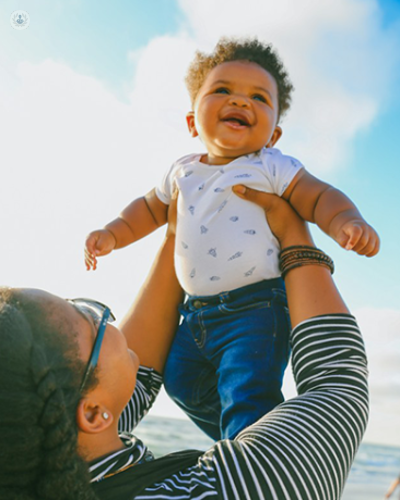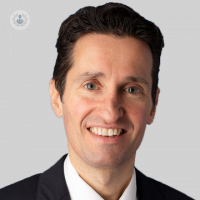Key signs that your child is suffering from an eye condition
Escrito por:Although babies and young children are not able to tell their parents about vision problems, unusual behaviours may indicate that abnormalities with the eyes or vision are at play. For new parents, regular contact with health visitors and the family GP provides the ideal opportunity to pass on any such concerns about signs of health or developmental issues so that they can be promptly addressed. In this informative article, highly respected consultant ophthalmologist Mr Aris Konstantopoulos sheds light on the most common eye conditions which affect children and the key signs which indicate that your child may be experiencing vision problems.

What signs can indicate that a child may not be able to see clearly?
The key signs to be aware of vary depending on the child’s age. If you observe any of the following behaviours in your baby, toddler, or child, it’s recommended to consult your GP or paediatrician to share your concerns.
Babies
- not engaging in eye contact with family and friends before the end of their second month
- not responding to lighting changes (e.g., the lights of a room being turned on or off) before the end of their second month
- not following the movement of an object or familiar face before the end of their third month
- eye movement that appears unusual or unexpected, such as jerking or moving from side to side for no apparent reason
Children
- frequent rubbing of the eyes
- bringing objects very close to their face
- sitting very close to the TV
- clumsiness or regularly bumping into things
- quick to tire from activities that require concentration on specific tasks, like reading or drawing
What are some common eye conditions in young children?
Astigmatism
With astigmatism, your child may have blurred vision both at distance and close by. They could benefit from using glasses.
Hyperopia
Also known as long-sightedness, your child might find looking at close objects tiring, or have difficulty in seeing them clearly. They may benefit from wearing glasses.
Myopia
Also known as short-sightedness, your child may be experiencing blurred vision for distance and may benefit from using glasses.
Amblyopia
With this condition, also known as lazy eye, one eye does not completely develop to its full potential, which can cause permanently reduced vision. The most common causes of amblyopia are astigmatism and long-sightedness.
Nystagmus, or “wobbling” eyes
With nystagmus, the eyes make repetitive movements of their own accord. If you observe these types of eye movements, contact your GP.
Cataract
Cataracts usually develop in older age, but sometimes newborns or young children can also develop cloudy lenses. Typically, a screening test is carried out for newborns within 72 hours of birth and again after 6 to 8 weeks. Congenital or childhood cataract affects vision but can also result in nystagmus. Contact your GP if you have any concerns about childhood cataract.
What causes eye conditions to develop in children?
Children can develop these types of eye conditions for a variety of reasons. Refractive errors like astigmatism, long-sightedness or short-sightedness can run in families or may be caused by environmental factors, such as excessive reading with infrequent breaks. Childhood cataract can be genetic and may be associated with other health problems or maternal infection during pregnancy, including rubella and chickenpox.
What should parents do if they have concerns about their child’s eye health or vision?
If you observe any of the symptoms mentioned in this article or are concerned that your child is not seeing well, it’s important to visit your GP, who will be able to refer you to the appropriate service.
If congenital or childhood cataract is suspected, you will be directed to services at your local hospital. On the other hand, if a refractive error, such as astigmatism or short-sightedness, is suspected, an initial consultation with an optician would be appropriate.
If you are concerned about your child’s eye health and wish to schedule a consultation with Mr Konstantopoulos, visit his Top Doctors profile today.


